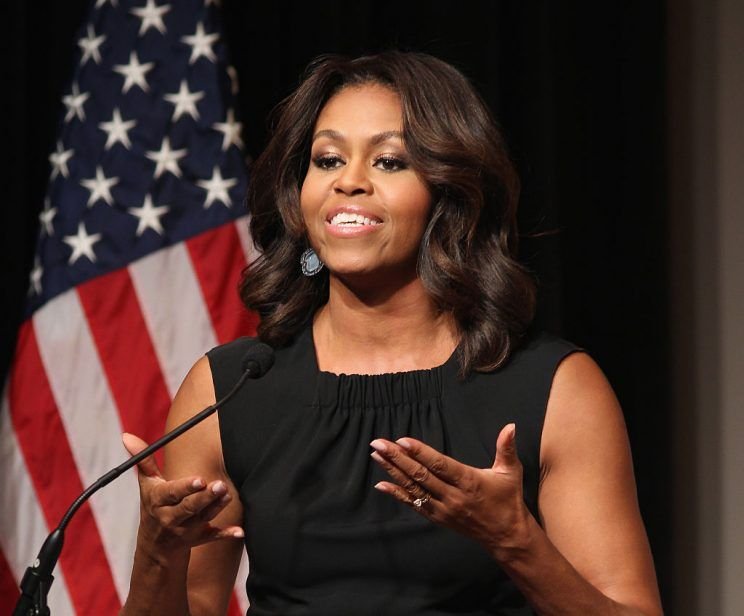The Birth of a Revolutionary Spirit
Michelle LaVaughn Robinson was born on January 17, 1964, in Chicago’s South Side, a neighborhood marked by racial segregation and economic hardship. Raised in a modest one-bedroom apartment on Euclid Avenue, she shared the small space with her parents, Fraser and Marian Robinson, and older brother Craig. Her father worked tirelessly as a city water pump operator despite suffering from multiple sclerosis, while her mother sacrificed career ambitions to nurture Michelle’s intellectual growth. The Robinson household emphasized discipline, education, and self-worth – values that would shape Michelle’s worldview. A gifted student, Michelle skipped second grade and was later accepted into Whitney M. Young High School, Chicago’s first magnet high school for gifted students. Few know that a high school counselor once told Michelle Obama she “wasn’t Princeton material” – a dismissive comment that only strengthened her resolve. She graduated as salutatorian in 1981 and was accepted into Princeton University, where she joined the mere 9% of Black students on campus.
Breaking Barriers at Harvard and Beyond
At Princeton, Michelle experienced profound isolation as one of the few Black women in her class. She later described feeling like a “visitor on campus” in her senior thesis titled “Princeton-Educated Blacks and the Black Community,” which examined how Black alumni navigated their identities after graduation. Her research revealed the tension between assimilation and cultural preservation – themes that would later inform her advocacy work. After graduating cum laude in sociology in 1985, she earned her Juris Doctor from Harvard Law School in 1988, where she joined protests demanding greater minority faculty representation. Following Harvard, Michelle joined Sidley Austin LLP, becoming one of the few Black women at the prestigious Chicago law firm. In 1989, she was assigned to mentor a summer associate named Barack Obama. Initially unimpressed by his “cocky” demeanor and cigarette habit, Michelle eventually agreed to a date after persistent courtship. Their romance blossomed, but Michelle’s career was already ascending – she soon left corporate law for public service, first as an assistant to Chicago Mayor Richard Daley, then as founding executive director of Public Allies Chicago, a leadership development program for young activists.

The Reluctant Political Partner
When Barack launched his political career, Michelle was initially resistant. She worried about the impact on their daughters Malia and Sasha, and privately questioned whether America was ready for a Black president. During the 2008 campaign, she faced intense scrutiny after saying, “For the first time in my adult life, I am really proud of my country.” Critics labeled her “angry” and “unpatriotic,” forcing her to recalibrate her public persona. Behind the scenes, she became Barack’s most trusted advisor, reviewing every major speech. As First Lady-elect, she negotiated fiercely for family privacy, insisting the White House install blackout curtains in the girls’ rooms and maintain normal school routines. In a little-known act of defiance, she once sneaked out with her daughters to volunteer at a homeless shelter, disguising their identities to avoid Secret Service detection.
Redefining the Role of First Lady
Michelle Obama transformed the East Wing into a powerhouse of social change. Her Let’s Move! campaign tackled childhood obesity through school lunch reforms and corporate partnerships, pressuring Walmart to reduce sugar and sodium in products. The White House Kitchen Garden, which she planted in 2009, became a symbol of her nutrition advocacy, yielding over 2,000 pounds of organic produce annually. Her Reach Higher initiative encouraged underserved youth to pursue education beyond high school, while Let Girls Learn invested $1 billion in girls’ education worldwide. Michelle also revolutionized White House fashion diplomacy, wearing emerging designers like Jason Wu and Tracy Reese, whose careers skyrocketed after she donned their creations. Her 2015 Tuskegee University commencement address broke new ground for a First Lady, candidly addressing racial discrimination: “They might see a Black woman and make assumptions about who I am.”
The Power of Becoming
Following the White House years, Michelle’s influence only grew. Her 2018 memoir “Becoming” shattered publishing records, selling over 15 million copies worldwide. The book revealed intimate struggles, including her experience with infertility and using IVF to conceive her daughters. Her accompanying stadium tour drew record crowds, with fans waiting overnight for tickets. In 2020, she launched the Michelle Obama Podcast, featuring candid conversations about relationships and societal issues. The Obamas’ Netflix deal produced acclaimed documentaries like “Waffles + Mochi,” which taught children about nutrition through puppetry. During the COVID-19 pandemic, she partnered with PBS to host a virtual storytime series, reading children’s books to isolated families.

Building a Lasting Legacy
The Obama Presidential Center, currently under construction in Chicago’s Jackson Park, represents Michelle’s most ambitious post-White House project. Scheduled to open in 2025, the $500 million complex will include a museum, public library, and the Obama Leadership Academy. Michelle personally advocated for local hiring quotas to ensure community benefit. Few know she has quietly paid college tuition for dozens of students she met during outreach events. In 2022, she launched the “We the People” voting rights initiative, combating voter suppression through grassroots organizing. Her Global Girls Alliance continues empowering adolescent girls through education partnerships in 50 countries.
The Private Woman Behind the Public Icon
Despite global fame, Michelle fiercely protects her privacy. She still shops at Target incognito and maintains close friendships from childhood. In her spare time, she enjoys knitting and solving jigsaw puzzles – ordinary hobbies for an extraordinary woman. Former staffers reveal she keeps a “gratitude journal” where she records daily blessings. This disciplined self-care routine helps her maintain balance while tackling systemic inequality. As she often says, “Success isn’t about how much money you make – it’s about the difference you make in people’s lives.”
Go to main page


